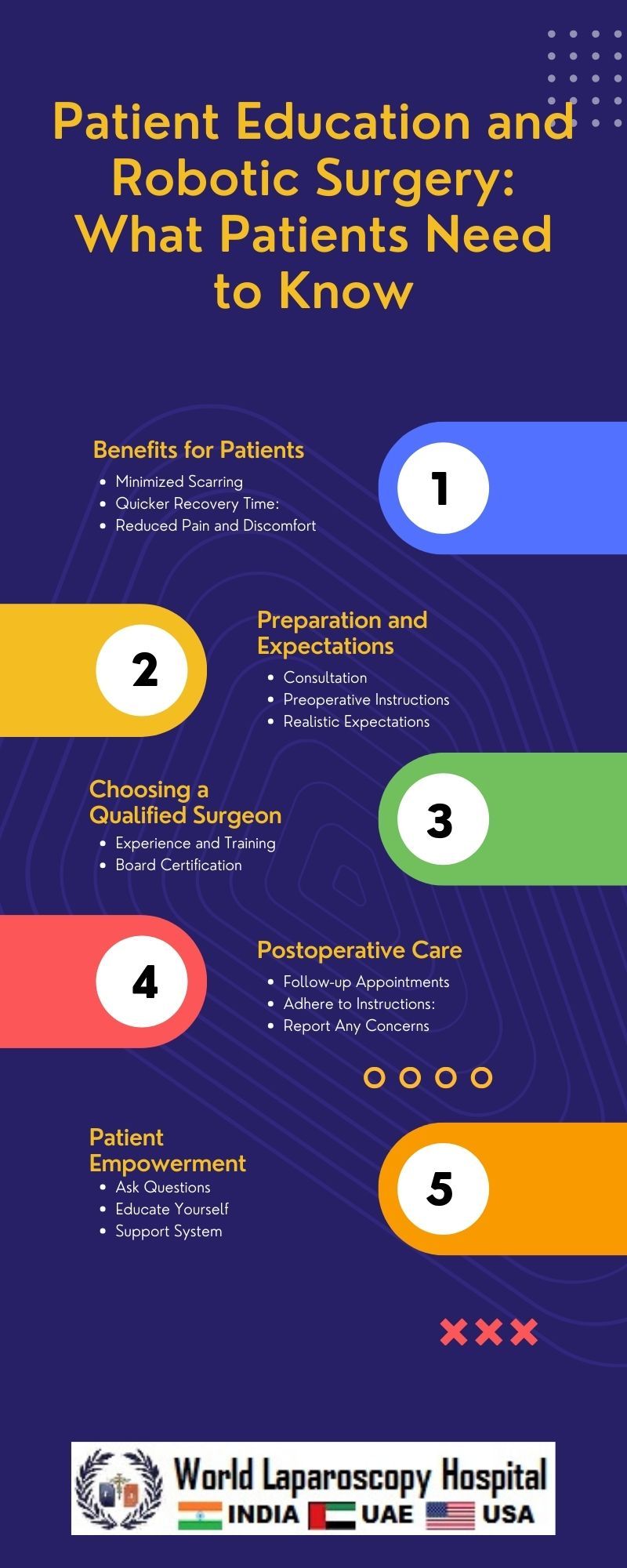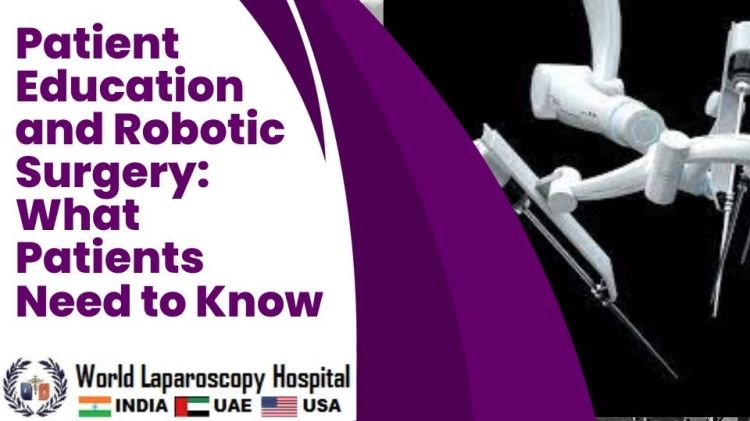Patient Education and Robotic Surgery: What Patients Need to Know
Introduction:
In the ever-evolving landscape of healthcare, technological advancements continue to reshape the way medical professionals approach diagnosis and treatment. One such groundbreaking development is robotic surgery, a cutting-edge technique that combines the precision of robotics with the expertise of skilled surgeons. As patients increasingly encounter this innovative approach, it becomes imperative to delve into the realm of patient education to ensure a comprehensive understanding of what robotic surgery entails.

The Rise of Robotic Surgery:
Robotic surgery, also known as robot-assisted surgery, has gained prominence in various medical specialties, including urology, gynecology, cardiothoracic surgery, and more. The da Vinci Surgical System, one of the most widely used platforms, enables surgeons to perform minimally invasive procedures with enhanced dexterity and precision.
How Robotic Surgery Works:
At its core, robotic surgery involves a console where surgeons control robotic arms that hold specialized instruments. These instruments, capable of mimicking the natural movements of the human hand, provide a greater range of motion and flexibility during surgery. This technology allows for smaller incisions, reduced blood loss, and faster recovery times compared to traditional open surgeries.
Advantages of Robotic Surgery:
Precision and Accuracy:
The robotic arms filter and stabilize a surgeon's hand movements, enabling unparalleled precision, which is particularly crucial in delicate procedures.
Minimal Invasiveness:
Smaller incisions result in less trauma to surrounding tissues, reducing pain and expediting the recovery process for patients.
Shorter Hospital Stays:
Patients often experience shorter hospital stays due to the minimally invasive nature of robotic surgeries, leading to quicker recoveries and lower healthcare costs.
Patient Education in the Digital Age:
As robotic surgery becomes more widespread, patient education plays a pivotal role in empowering individuals to make informed decisions about their healthcare. In today's digital age, information is readily available, but deciphering reliable sources and understanding complex medical concepts remains a challenge for many.
Access to Information:
Online Resources:
Patients can access a plethora of information on robotic surgery through reputable websites, medical journals, and educational platforms. However, caution must be exercised to distinguish between credible sources and misinformation.
Educational Seminars and Workshops:
Healthcare institutions can organize seminars and workshops to educate patients about robotic surgery, providing a platform for interactive learning and addressing specific concerns.
The Role of Healthcare Providers:
Clear Communication:
Effective communication between healthcare providers and patients is paramount. Surgeons should explain the benefits, risks, and potential outcomes of robotic surgery in a language that patients can comprehend.
Patient Counseling:
Dedicated counseling sessions, where patients can openly discuss their fears and uncertainties, contribute to a more informed and confident decision-making process.
Understanding the Robotic Surgical Experience:
For patients facing the prospect of robotic surgery, it is essential to grasp what to expect before, during, and after the procedure. Familiarity with the surgical journey can alleviate anxiety and foster a sense of control over one's health.
Preoperative Phase:
Patient Assessment:
Before recommending robotic surgery, healthcare professionals thoroughly evaluate a patient's medical history, overall health, and the specific condition requiring treatment.
Informed Consent:
Patients should actively participate in the decision-making process, understanding the procedure's details, potential risks, and expected benefits before providing informed consent.
Intraoperative Phase:
Operating Room Setup:
Patients might wonder about the operating room setup for robotic surgery. Explaining the console, robotic arms, and the collaborative nature of the procedure helps demystify the surgical environment.
Anesthesia and Monitoring:
Understanding the anesthesia process and monitoring during surgery provides reassurance to patients, allowing them to envision the controlled and monitored nature of the procedure.
Postoperative Phase:
Recovery and Rehabilitation:
Patients should be informed about the expected recovery timeline, postoperative care, and any rehabilitation exercises necessary for a swift and successful recovery.
Follow-up Care:
Clear instructions regarding postoperative appointments, potential complications to watch for, and guidelines for resuming normal activities contribute to a smoother post-surgical experience.
Addressing Patient Concerns and Myths:
Despite the numerous benefits of robotic surgery, patients may harbor concerns or misconceptions that hinder their acceptance of this innovative approach. Addressing common fears and dispelling myths fosters a more positive and informed perspective.
Safety Concerns:
Robotic Systems Reliability:
Providing insights into the rigorous testing and safety measures undertaken in the development of robotic surgical systems can alleviate concerns about system reliability.
Surgeon Competency:
Emphasizing the extensive training and expertise required for surgeons to operate robotic systems instills confidence in the competency of the healthcare team.
Cost Considerations:
Insurance Coverage:
Patients should be aware of insurance coverage for robotic surgeries and explore potential financial assistance programs offered by healthcare institutions.
Long-term Benefits:
Understanding the long-term benefits, such as reduced recovery time and lower postoperative complications, can help patients appreciate the value proposition of robotic surgery.
The Future of Robotic Surgery: A Collaborative Approach
The future of robotic surgery holds exciting prospects, with ongoing research and technological advancements promising even more refined and efficient procedures. Collaborations between engineers, surgeons, and patients are crucial in shaping the trajectory of robotic surgery and ensuring its continued success.
Emerging Technologies:
Artificial Intelligence Integration:
The integration of artificial intelligence (AI) into robotic surgical systems holds the potential to enhance decision-making during procedures, further improving patient outcomes.
Telemedicine and Remote Surgery:
Advancements in telemedicine may enable surgeons to perform robotic surgeries remotely, expanding access to specialized care and expertise.
Patient Involvement in Research:
Clinical Trials and Patient Participation:Encouraging patient participation in clinical trials and research initiatives fosters a sense of shared responsibility and ensures that the patient perspective is considered in shaping the future of robotic surgery.
Conclusion:
In conclusion, patient education is a cornerstone in demystifying the realm of robotic surgery. As this transformative technology continues to redefine the landscape of healthcare, a collaborative approach involving healthcare providers, patients, and researchers is essential. Empowering patients with knowledge, addressing concerns, and fostering open communication will not only enhance their confidence in choosing robotic surgery but also contribute to the ongoing evolution of this groundbreaking field. By embracing education and understanding, patients can actively participate in shaping the future of healthcare and reaping the benefits of advancements like robotic surgery.


